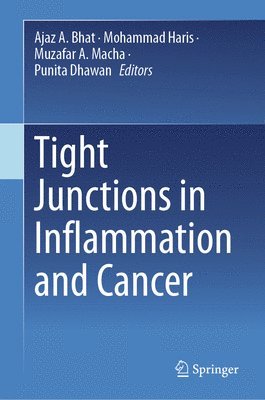
- Format
- Inbunden (Hardback)
- Språk
- Engelska
- Antal sidor
- 193
- Utgivningsdatum
- 2023-10-13
- Förlag
- Springer Verlag, Singapore
- Dimensioner
- 234 x 156 x 13 mm
- Vikt
- ISBN
- 9789819924141
- 468 g
Tight Junctions in Inflammation and Cancer
- Skickas från oss inom 7-10 vardagar.
- Fri frakt över 249 kr för privatkunder i Sverige.
Passar bra ihop
De som köpt den här boken har ofta också köpt Braiding Sweetgrass av Robin Wall Kimmerer (häftad).
Köp båda 2 för 2395 krKundrecensioner
Fler böcker av författarna
-
Multi-Omics Technology in Human Health and Diseases
Muzafar A MacHa, Ajaz A Bhat, Tariq A Masoodi, Ajaz A Bhat Ph D, Muzafar A MacHa
-
Alternative Splicing and Cancer
Muzafar A MacHa, Ajaz A Bhat, Surinder Kumar Batra, Muzafar A MacHa, Ajaz A Bhat
-
Neglected and Underutilized Crops
Muzafar Ahmad MacHa, Sajad Majeed Zargar, Ajaz A Bhat, Shahab Uddin, Ajaz A Bhat
Övrig information
Dr. Ajaz A. Bhat¿ currently works as a staff scientist at Sidra Medicine, Qatar. He completed his Ph.D. in vaccine immunology from All India Institute of Medical Sciences, AIIMS, New Delhi, one of the premier medical institutes in India. After his Ph.D., he moved to Vanderbilt University Medical School (VUMS), Nashville, TN, USA, for a postdoctoral fellowship. During his eleven years of post-PhD training, he gained broad experience of the importance of tight junction proteins (Claudins) in intestinal homeostasis and colorectal cancer pathogenesis. In his second postdoctoral fellowship, he studied e role of bile acid induced APE1/Ref1 in the pathogenesis of esophageal cancer. Currently, his research focus is cancer metabolism, cancer imaging, cancer immunotherapy, drug resistance, Cancer Genetics, Obesity, and Diabetes. He has published his findings in reputed journals like Nature Communications, GUT, Oncogene, Cancer Research, and Molecular Cancer. He has received awards from the Immunology society and the American Association of Cancer research. Dr.¿ Bhat was recently awarded as an outstanding researcher from Sidra Medicine. He is an active member of many Immunology and Cancer societies and serves in the editorial board and review committee of many peer-reviewed journals. Dr. Punita Dhawan is currently working as a Professor at the Department of Biochemistry and Molecular Biology, University of Nebraska Medical Center, Omaha, Nebraska, USA. Her research focuses on understanding the novel biomarkers and therapeutic targets for colorectal cancer progression and metastasis. The field of epithelial barrier physiology with specific consideration of claudin proteins was born in 1998, and in 2005 she published a ground-breaking finding that contrary to the conventional wisdom, an upregulated claudin-1 expression promotes sporadic colon cancer progression in JCI (J Clin Invest. 2005 Jul;115(7):1765-76).¿ After that, her ongoing investigations to understand the molecular details of the role of this protein in the regulation of intestinal homeostasis and pathologies have resulted in publications in Gastroenterology, GUT, Cancer Research, Mucosal Biology, Oncogene, etc.. In 2015, she demonstrated the role of Claudin-7 as a tumor suppressor in colorectal cancer, and this paper has received great attention. Her studies also focus on determining the role of cancer stem cells (CSCs) in colon cancer metastasis and chemoresistance. In this course, her group has generated novel reagents, genetically modified cell lines, and multiple mouse models with specific modification of claudin-1 and claudin-7 proteins alone or in association with other significant co-founders but also established our leadership in this field of investigation. As PI or co-Investigator on federally funded grants, she laid the groundwork for the proposed research to perform these studies and have the expertise, leadership, and motivation necessary to successfully carry out the proposed work. In addition, a member of the iCaRe2 Biobank/Biorepository has access to a "state of the art" patient cohort of CRC samples. As principal investigator or co-Investigator on federal, regional, and local grant funding, including NIH-R21, R01 and VA-merit awards aimed at intestinal pathologies and cancer, she effectively demonstrates leadership as the PI of this unique PI multi-disciplinary grant proposal. Dr. Mohammad Haris¿is an associate professor at the Center for Advanced Metabolic Imaging in Precision Medicine, Department of Radiology, Perelman School of Medicine, University of Pennsylvania, Philadelphia, USA. He leads the molecular and metabolic imaging research program to develop novel MR imaging methods to image and diagnose various human diseases at their incipient stage. His additional role provides interdisciplinary training projects and an educational environment on biomedical imaging to undergraduate, masters, and graduate students, emphasizing translational and cl...
Du kanske gillar
-
Nexus
Yuval Noah Harari
Häftad


